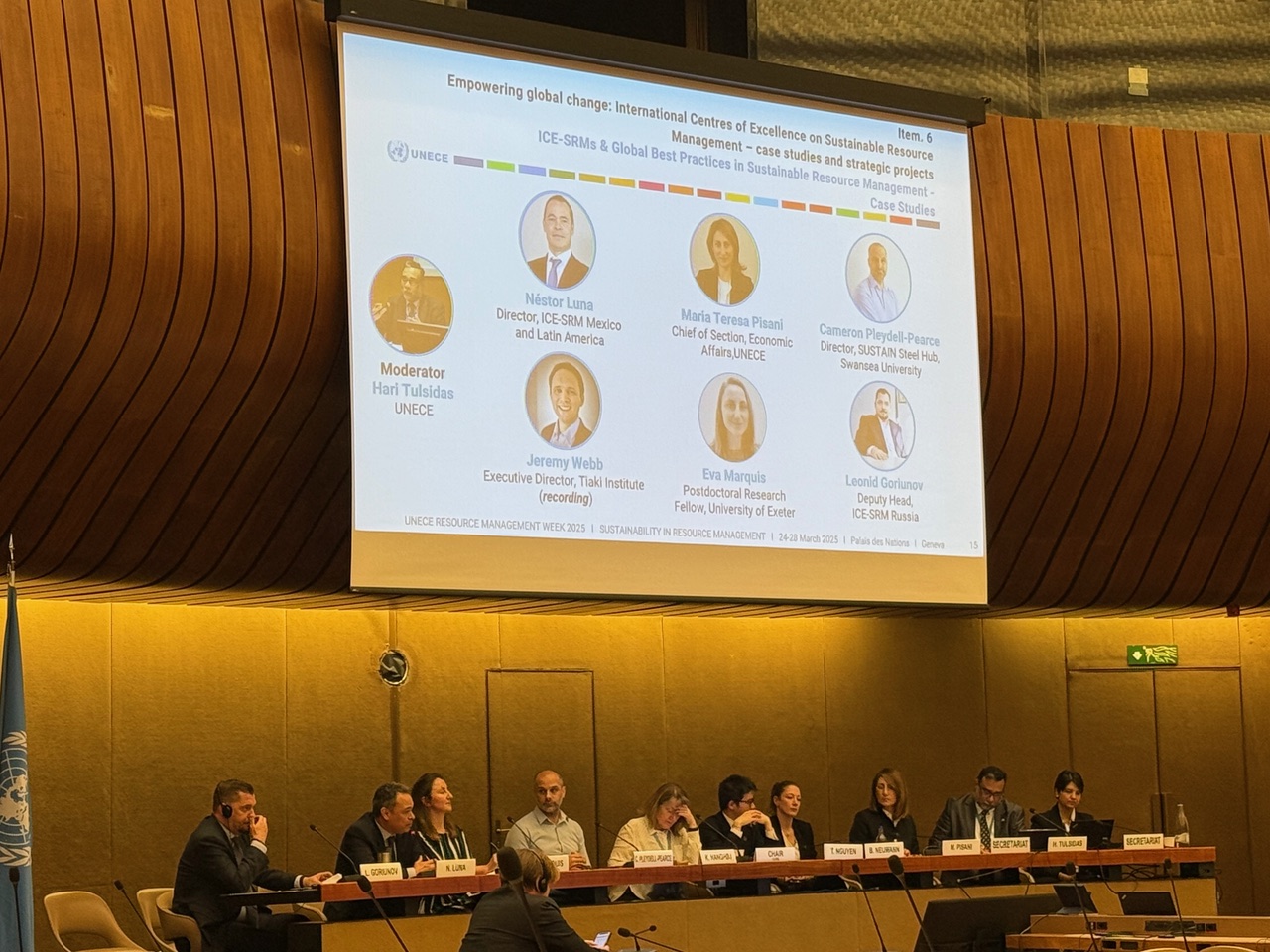By Craig Withers, University of Exeter.
The UK ICE SRM team had a strong and diverse presence at the UNECE Resource Management Week in Geneva this year from 24th till the 28th of March. The event hosted and heard from international experts, policymakers, researchers, and practitioners to explore many broad reaching topics, including solutions and frameworks for responsible resource use. Many of these described ideas about how to implement both the UN Framework Classification for Resources (UNFC) and the UN Resource Management System (UNRMS) with methodologies and case studies.
UNRMS Implementation in Principle and Practice.
One of the week’s highlights was the UNRMS short course on the 26th March, where our very own Professor Frances Wall from Camborne School of Mines presented on “UNRMS Tools for Sustainable Resource Management.” Her presentation offered a concise overview of how the UNRMS can serve as a transformative framework for aligning mineral development with sustainability goals. You can view her slides here.
On ICE-SRM Day (27 March), Dr Nick MacInnes (DEFRA) introduced the Centre with some thoughts on circular economy and Professors Peter Hopkinson and Markus Zils (University of Exeter Business School) and shared a case study on the Circular Economy Data Observatory. This initiative, developed in collaboration with DEFRA, aimed to harness data to inform circular economy policy and practice in the UK. Their session demonstrated how structured, evidence-based approaches can accelerate systems change and better inform national strategies. By doing so, several principles from the UNRMS can be used for “Delivering the UNRMS through the practical application of data, innovation, and policy”. Their slides can be found here.
Research Excellence and Practical Insight
Dr Eva Marquis, postdoctoral researcher at Camborne School of Mines, University of Exeter presented a fantastic case study exploring the intersection between artisanal and large-scale mining in Zambia’s Copperbelt. Her fieldwork brought to light examples of how resource governance challenges manifest on the ground and how frameworks like the UNFC and UNRMS can be adapted to promote more inclusive and sustainable outcomes. Her slides can be found here.
Swansea University Professor of Materials Sciences Cameron Pleydell-Pearce contributed an excellent presentation on enhancing metal sustainability. His session focused on strategies for improving end-of-life steel recycling, addressing the need to maintain metal quality in a circular economy. Through the application of UNRMS principles, he showed that with improved measurement, governance, and international collaboration can help close the steel scrap loop, lower carbon emissions, and strengthen supply chain resilience. His talk and findings could be applicable to wide reaching and adjacent disciplines, the details of which can be found here.
Presentations by two UK ICE SRM colleagues from UCL were very well received. Dr Ramya Venkataraman (UCL-DEFRA Research Fellow) shared careful analysis of biomass waste management in the UK. The research showed how UNRMS principles can guide better integration of circular economy thinking within construction and infrastructure sectors. Meanwhile, Chi Zhang contributed his case study on advancing the timber circular economy. Applying UNRMS as an evaluation framework, Chi Zhang assessed the effectiveness of the UK’s timber policies in promoting circular economy practices. The research highlighted the importance of design for disassembly, data standardisation, wood waste certification, and stakeholder engagement as crucial factors in supporting a sustainable timber sector. Ramya’s talk can be found here, while Chi Zhang’s timber study can be found here.
The last, but by no means least, UK team was composed of British Geological Survey (BGS) members. This talk was led by Tom Bide, who provided details on work around the implementation of UNRMS for good resource governance. His case study-based session focused on mining practices in the Philippines, lithium extraction in South America, and sand extraction in The Gambia and sustainable ways to achieve success in each of these scenarios. The talk showed that UNRMS principles are being applied across diverse sectors to strengthen environmental, social, and governance standards in resource management.
Collaboration at its core.
Throughout the week, the UK ICE-SRM was recognised for its collaborative approaches, particularly in the afternoon panel on 27 March which focused on global best practices, as well as the UNRMS workshop which helped to identify ways for implementing the UNRMS. As one of the most active Centres of Excellence, the UK team engaged in dialogue with international partners from across Africa, Latin America, and Asia, helping to shape the future direction of UNRMS and UNFC implementation. Particularly the ICE SRM for Latin America, who we hope to collaborate with soon. Here is their brilliant website: https://www.ice-srm-lat.org/ .
The Geneva sessions showed just how important data, inclusivity, and strategic partnerships are in driving sustainable resource management. By contributing cutting-edge research and real-world case studies, the UK ICE-SRM reaffirmed its commitment to advancing the global sustainability agenda.
Explore More using the programme links below.
- Full EGRM-16 Programme (PDF)
- ICE-SRM Day Programme (PDF)
- Full programme view – scroll down and click on drop down’s for each individual day!



